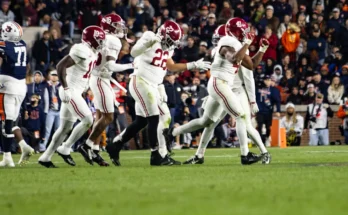Notre Dame and Clemson Agree to Groundbreaking 12-Year Football Scheduling Deal Beginning in 2026 to Boost Rivalry and Exposure
In a significant move for college football, Notre Dame and Clemson have agreed to a 12-year football scheduling deal that will dramatically reshape future seasons and intensify one of the sport’s emerging rivalries. The two programs, both nationally respected and steeped in tradition, announced the agreement in a joint release, confirming that they will face off every year from 2026 through 2037. The deal marks a powerful alignment between an independent powerhouse and a perennial ACC contender, and is poised to have a wide-reaching impact on recruiting, television rights, postseason implications, and the broader landscape of college football.
The origins of this matchup gaining national prominence can be traced back to the past decade, with the most notable meeting coming in the 2020 season. That year, Notre Dame—still independent but playing a full ACC schedule due to the COVID-19 pandemic—hosted top-ranked Clemson in South Bend. With Trevor Lawrence sidelined, backup D.J. Uiagalelei led the Tigers in a double-overtime thriller that ended in a 47-40 victory for the Irish. Clemson would get revenge later that year in the ACC Championship Game, but that season elevated the profile of the rivalry. The games have been competitive, emotionally charged, and immensely popular with fans and media alike.
This 12-year commitment represents an unprecedented level of scheduling stability for Notre Dame in particular, which has long operated as a football independent. Though the Irish have committed to playing five ACC opponents each year as part of their agreement with the league, there has never been a formalized long-term scheduling guarantee with any one program. With Clemson now locked in as an annual opponent, the Irish will enjoy not only consistent elite competition but also a marquee matchup that television networks will salivate over.
For Clemson, this deal further cements its status as a national program with broad appeal. Already known for competing at the highest level of college football under head coach Dabo Swinney, the Tigers will now be assured of an annual contest against a high-profile opponent from outside the conference. That exposure could prove crucial as the College Football Playoff expands and strength of schedule becomes even more critical in the eyes of selection committees.
From an administrative standpoint, both universities cited shared values, a commitment to excellence, and a desire to elevate college football’s future as key reasons for the agreement. Notre Dame athletic director Jack Swarbrick, who has been instrumental in navigating the Irish through various scheduling challenges and realignment waves, described the deal as a “foundational building block for the next era of Notre Dame football.” He noted that playing Clemson annually “represents everything we want in a football rivalry—toughness, tradition, and national relevance.”
Clemson athletic director Graham Neff echoed those sentiments, saying the deal is a “visionary move for the program and the fans.” Neff pointed to the high ratings and electric atmospheres from recent matchups with Notre Dame as evidence that this series deserves a permanent place on the college football calendar. “This is about more than just games,” Neff said. “It’s about telling the story of two proud institutions and giving our players the chance to compete on the biggest stages.”
The games will alternate annually between Notre Dame Stadium in South Bend and Memorial Stadium in Clemson. The first game under the new agreement will take place in 2026 at Clemson, with Notre Dame hosting in 2027. From there, the rotation will continue through 2037. All games are expected to be broadcast on major national networks, with kickoff times and specific dates announced closer to each season.
Importantly, this deal provides a predictable tentpole game each fall that will serve both programs in different but equally important ways. For Notre Dame, it ensures a high-profile opponent that satisfies strength of schedule concerns and appeals to television partners. For Clemson, it offers another opportunity to sharpen its playoff résumé while challenging its roster against a non-conference opponent with elite-level talent.
The recruiting implications of this deal cannot be overstated. Both programs frequently find themselves competing for similar players, particularly in the South and Midwest. Now, prospects considering either school will be able to count on playing in one of the sport’s most electric environments every year. It also gives coaches a powerful recruiting pitch: a guaranteed game against a storied opponent, broadcast to a national audience, every season.
Analysts have already begun speculating about how the Notre Dame-Clemson series could influence College Football Playoff selection. With the playoff expanding to 12 teams, strength of schedule, quality wins, and national relevance will carry increased weight. In some years, a close loss in this series might not eliminate a team from contention, while a signature win could serve as the defining moment of a campaign. The stakes, already high, will only continue to grow with each passing season.
Moreover, this agreement stands in contrast to the fluid and often chaotic nature of college football scheduling in the modern era. With conference realignment, television contracts, and playoff expansion creating year-to-year uncertainty, Notre Dame and Clemson have opted for long-term clarity. Fans, players, and administrators alike will benefit from the consistency. And in a sport where tradition is both sacred and increasingly rare, preserving and growing this rivalry is a notable achievement.
Reaction across college football was swift and enthusiastic. ESPN analyst Kirk Herbstreit called it a “massive win for fans of the game,” noting that few matchups deliver both history and future promise the way Notre Dame-Clemson does. FOX Sports’ Joel Klatt praised the scheduling foresight, saying, “These are two programs with vision, and this deal proves it.” On social media, fans of both schools expressed excitement, with many already circling future dates as potential travel plans and watch parties.
There are still details to be ironed out. Notre Dame’s ACC obligations, traditional rivalries (such as USC, Navy, and Stanford), and its pursuit of other national matchups must all be balanced. Clemson’s increasingly demanding ACC slate and potential for SEC non-conference showdowns will also play a role in future scheduling complexities. But both programs have indicated they are committed to making the logistics work. In the end, the benefits clearly outweigh the complications.
This scheduling agreement arrives at a time when college football is undergoing seismic changes. From NIL to the transfer portal to the influence of media rights and realignment, stability is a rare commodity. In agreeing to a 12-year commitment with each other, Notre Dame and Clemson are making a powerful statement: tradition still matters. Rivalries still matter. And games that excite players, fans, and television partners alike still deserve pride of place in the sport’s future.
It’s not just about tradition—it’s about evolution. This deal reflects a forward-thinking approach that recognizes the need for top-tier programs to work together to preserve what’s great about college football while adapting to new realities. Notre Dame and Clemson have done more than just schedule a dozen games; they’ve invested in a long-term vision of excellence.
Looking ahead, the possibilities are tantalizing. Future matchups could feature Heisman contenders, playoff bids on the line, or even previews of postseason rematches. Stadiums packed with 80,000-plus fans. Primetime kickoffs. GameDay visits. Historic finishes. The moments are yet to be written, but the stage has now been set.
In the end, this 12-year deal is more than a calendar commitment—it’s a cultural one. It reaffirms that even in a shifting college football landscape, some things can still be counted on: two great programs, locking horns on the gridiron, year after year. And for fans of the Fighting Irish and the Tigers, that’s the best news they could hope for.



